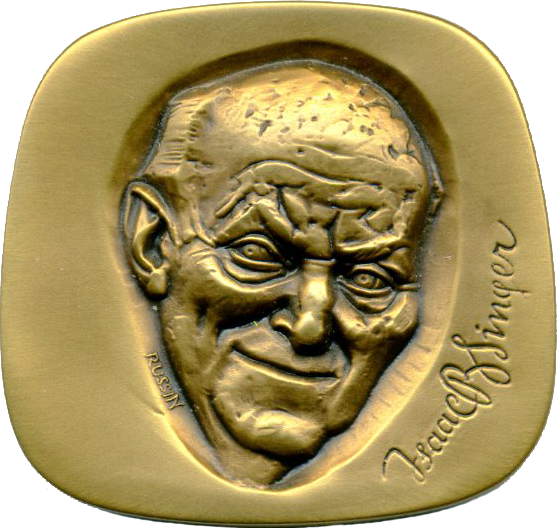 |  |
Isaac Bashevis Singer medal with obverse designed by Robert Russin and reverse by Mel Wacks, struck by Johnson Matthey in quantities of 350 bronze, 60 pewter, 100 pure silver, and 21 10kt gold. Obverse: Portrait, Isaac B Singer (signature), RUSSIN. Reverse: FREE WILL … IS LIFE’S ESSENCE (English and Yiddish). 47 x 45 mm.
Twenty-nine year old Isaac Bashevis Singer, sensing the rapidly approaching catastrophe in Europe, fled Poland and came to America in 1935. His sole claim to fame at the time was a single Yiddish book published in Poland: Satan in Goray. He could speak only three words of English: “Take a chair.” Singer feared that his lot “was to be one of those writers who write one book and become silent forever.”
For the next ten years Singer barely eked out a living as a critic for the leading Yiddish newspaper, The Forward. In this period, his total income from serious literary efforts amounted to a minuscule $90 honorarium received when Satan in Goray was published in the United States in Yiddish in 1943, the same year that Singer became an American citizen.
Finally in 1945, Singer began writing The Family Moskat, which was serialized each week in The Forward. He continued writing for them, saying “I haven’t missed a week, except that I get four week’s vacation.” Translated into English. Singer’s delightful stories have appeared in Commentary, The New Yorker, and even Playboy magazine. His editor at Doubleday wrote that “Isaac Bashevis Singer is a literary figure of imposing stature. [His] prolific output of short stories, children’s books, plays, scholarly works and novels are received and embraced by an enormous and devoted audience.” In an interview, Rebecca West indicated “I regard Isaac Bashevis Singer as the greatest writer of today.”
Love is a frequent theme in Singer’s writings, along with religion and the occult. His books have twice won the National Book Award, and often found their way into best seller lists. They include The Spinoza of Market Street, The Magician of Lublin, The Slave, In My Father’s Court, Passions, and Lost in America. One of Singer’s short stories, Yentl, was transformed into a major motion picture by Barbra Streisand. Success did not change him. After receiving the Nobel Prize for Literature in 1978, Isaac Bashevis Singer said: “I will still live at the same address. I will still have the same telephone number. Do you think that winning a prize can change a man’s character?”